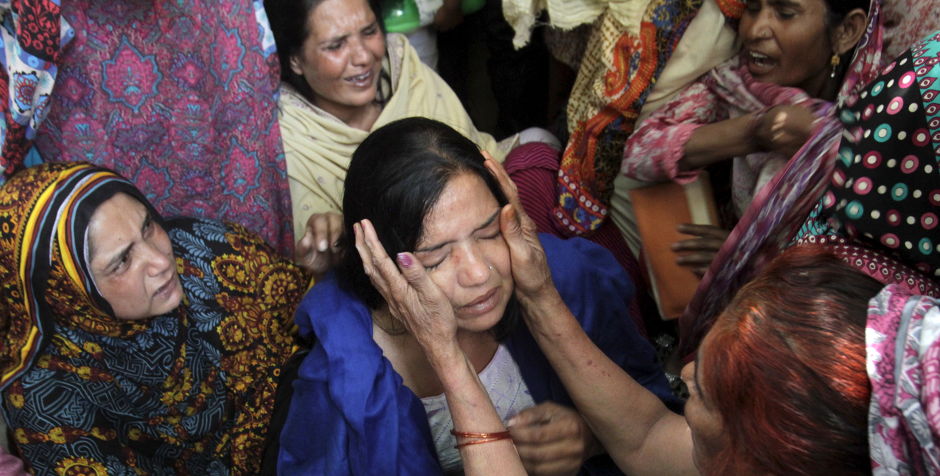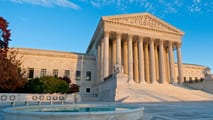

More than 200 Christians’ Houses set on Fire over Blasphemy Accusation in Pakistan
200 Christians’ Houses set on Fire
The plight of Christians in Muslim nations continues to deteriorate as evidenced by a minor alteration that ended horrific violence, destruction, and persecution of a Christian community in Pakistan. Center for Law and Justice (CLJ) in Pakistan, an affiliate of the ECLJ, found out during its fact-finding visit that Sawan Masih, a Christian living in Joseph Colony, Pakistan, had an argument with his Muslim friend Shahid Imran – two friends of more than fifteen years who often argued about various topics. That night, Masih allegedly insulted the Prophet of Islam.
The next morning, on March 7, Shahid met his friend Muhammad Shafiq who had connections with iron market unionists. Shafiq took Shahid to union leaders who assured him of their support. The Aman Group (Peace Group) and Ittehad Group (Unity Group) told Shahid that he could take revenge on this insult if he followed their directions. The factory owners of Badami Bagh had recently offered to purchase the homes of the Christian residents, and to these businessmen, this incident seemed like a great opportunity to obtain the land for free. The next day, March 8, Shahid visited Masih’s billiard shop with Shafiq and three other union workers. Shafiq was armed with a long knife and was shouting that he would decapitate the blasphemer’s head. Masih was not present and did not know that people were calling for his life. An eyewitness told the CLJ that he “had sensed that Shahid was going to do something seriously bad to the entire Christian community.”
At 3:00 p.m., Shahid lodged complaint number 112/13 against Masih under Section 295-C of Pakistan Penal Code, which makes an insult of the Prophet of Islam a capital offense. One hour later, local mosques announced that Masih had blasphemed the Prophet of Islam. Masih did not come to the colony that evening after he had learned from his friends that a case had been registered against him. Taking advantage of the situation, both of the unions announced a strike in the steel factories to gain a political advantage in their upcoming union elections. Due to the strike, all the factory workers were available to attack Joseph Colony the next day, March 9.
The police negotiated with the Christian leaders and assured them that if Sawan Masih were handed over to police, the Christians would not be harmed. After the police told the Christians that the matter would be resolved only if Masih were handed to them, they handed Masih over to the police around 2:00 a.m. on March 9.
Nevertheless, at 8:00 a.m. on March 9, Muslim groups poured out of the factories to demand the arrest of Sawan Masih. Although Masih was already in police custody the night before the strike, local police and politicians purposely concealed this from the angry Muslim groups. Neither the police, nor the negotiating Muslim leadership let the angry protestors know that Masih had been handed to the police.
Fearing imminent attack, most of the Christians in Joseph Colony had fled their homes the night before the attack. The next morning, policemen ordered the remaining Christians to evacuate their homes, or they would be killed by the angry protestors. According to Jamila Bibi, wife of Patras Masih, the Christians leaving the colony on the morning of the attack were forced by the clerics and factory workers to recite the Islamic conversion formula: “There is no god but Allah, and Muhammad is His Prophet.” She held a knife as she left the colony to ward off protestors who intended to rape and humiliate the Christian women.
At 10:00 a.m., about 2,000 Muslim protestors demanded that the “blasphemer” be put to death. As the police force slowly arrived at the scene, they made no effort to inform the protestors that Masih had already been taken into the police custody. According to Riaz Masih and Shahbaz Masih, the police silently watched while the Muslim protestors stole valuable possessions and destroyed Christians’ homes. The firefighter service reached the colony in time to save the homes, but the angry protestors did not let the firefighters in for several hours. Moreover, the police did not help the rescuers enter the colony. According to one anonymous police officer, the ruling party, Pakistan Muslim League-Nawaz (PML-N), was not in favor of stopping the protest because it did not want to jeopardize its position in the upcoming general elections.
After the protestors torched the Christians’ homes, the police roped off the area and did not allow the residents of the colony enter. However, the police did allow some media sources and some Christian leaders to enter the colony. A Muslim cleric, named Maraj Din, present at the scene, said: “There is nothing wrong what has happened to the Christians. They deserve it. Now the government must act and punish the blasphemer.” He said that the clerics had assured PML-N Member of National Assembly, Muhammad Malik Riaz, that no action would be taken against the Christians if Masih would be handed over to the police. He added that they “were not told that Masih had been arrested by the police.”
When the CLJ asked Police Inspector Khalid who could be blamed for this barbarity, he said, “Muslims cannot tolerate blasphemy against their prophet so the Christians were themselves responsible for this incident.” When Muhammad Ijaz was interviewed, he became abusive and said: “The incident is laudable! It is the befitting response to these Christians. Our rulers are lackeys of the West. This is why these dirty dogs of the U.S. have immediately announced rebuilding of Christians’ houses.”
Sarwar Bibi, wife of Pastor Khalid Masih told the CLJ that there were several Bibles in the church that had been urinated on and trampled under feet. When she brought this to the notice of media personnel, they took away the evidence.
The following day, Christians across the country protested the attack; but the same police force that watched silently as Christian houses were ransacked, suddenly became very active in suppressing the Christian demonstrators. The police officers used their batons to move the crowds and fired shots to disperse them. Sadly, a woman died in her home in Yahounabad, a Christian slum, because of teargas exposure after the police had forcibly entered several homes and used excessive teargas to quell protests inside the colony.
The Response of Government and Society
The Punjab government acknowledged its inefficiency in not being able to protect the Christians and chief minister Shahbaz Sharif ordered immediate rehabilitation. It promised food and security for the affected persons. It provided the victims 200,000 Pakistani rupees, a figure later increased to 500,000 (roughly $5,000). The government also ordered immediate rebuilding of damaged houses. The chief minister said that those responsible for the attack would be apprehended.
Immediately following the incident, several Islamic leaders condemned the attack. On March 11, the National Assembly interrupted its agenda to condemn rioting against the Christians. The National Standing Committee on Human Rights took notice of the incident and asked the Inspector General of the Police to explain the lapse in security. The chairman Riaz Fatyana said that the Punjab government could have averted the incident if the police had acted timely.
Hypocrisy of the Punjab Government
Christians make up about 1.6 percent of the total population of 180 million. Most of the Christian population is concentrated in the province of the Punjab. The PML-N is the ruling party in this province. In 2009, the beginning of PLM-N’s tenure, communal riots against Christians took place in Kasur and Gojra. In July 2009, more than 50 houses were ransacked in Kasur, and later in August 2009, more than 100 houses of Christians were torched in Gojra. Eight Christians died in the attacks in Gojra.
Although the Punjab government rebuilt houses burned in the Gojra attack, the government failed to properly prosecute those involved in the attack or amend the Pakistan Penal Code as recommended by the judicial tribunal appointed to inquire into the Gojra incident. This record shows that the government will not follow through on its promises, lulling the Christian community into a false sense of security.
Conclusion
Articles 24 and 25 of Constitution of Pakistan guarantee equal rights to all citizens and protection of every citizen’s property. So far, only the Christian community has been subjected to such communal attacks. Recurrence of such incidents indicates that Christians are hated in the country to the extent that it is difficult for the Muslim majority to see Christians having any visible possession of land or other material belongings. In all cases, the loss of life was minimal compared to attacks on other religious minorities, but the damage to property was catastrophic.
Attacks on Christians are easy because Christians have no political connections. They do not have representation in the bureaucracy or civil services. Their weak social, political, and economic conditions will keep them as easy prey.
Also, bias towards the Christians in the state institutions, lack of their access to influential positions in the government, government’s apathy to the religious minorities and appeasement policy toward religious extremist elements for political gain, and weak judicial system increase vulnerability of the Christian community to such attacks. The pattern shows that recurrence of communal strife against the Christians is on the rise and is permeating metropolitan life. It also shows that Pakistan is fast slipping into extremism, which is rupturing its urban social fabric.











